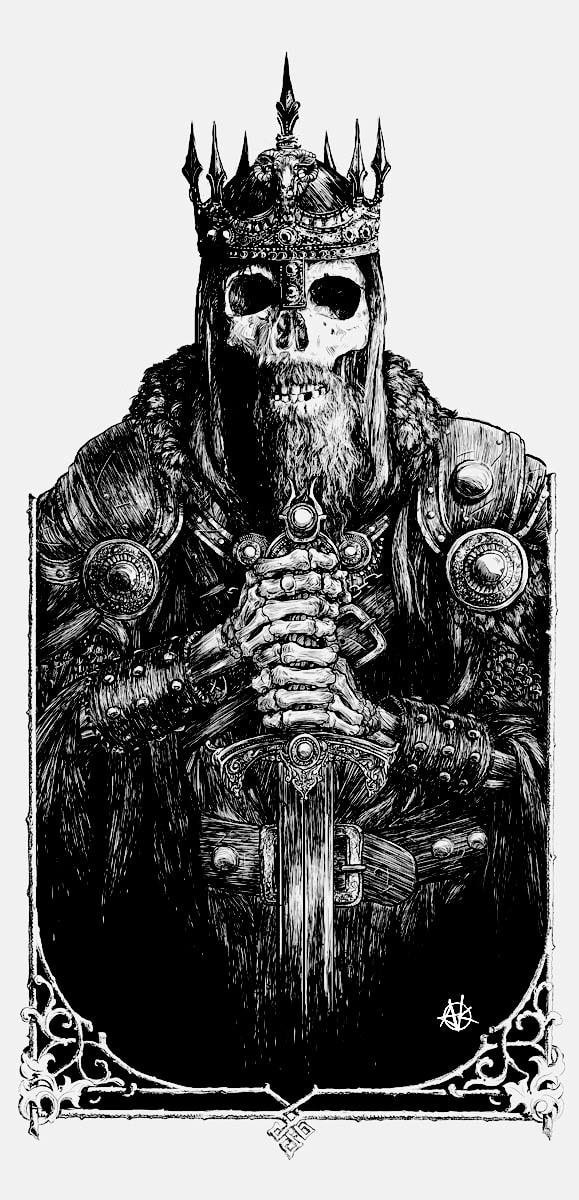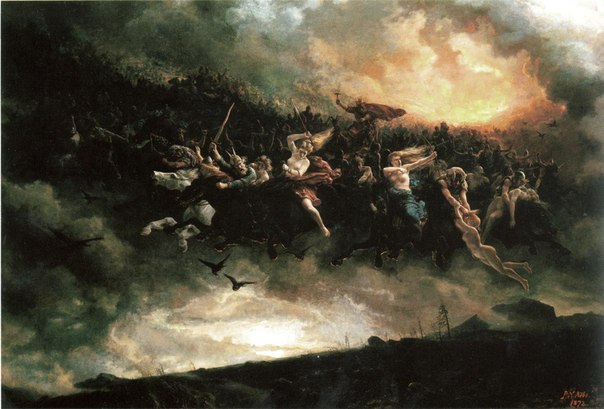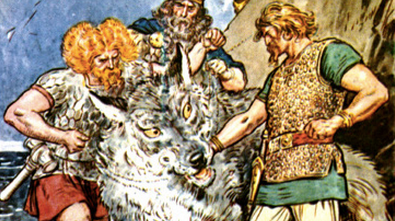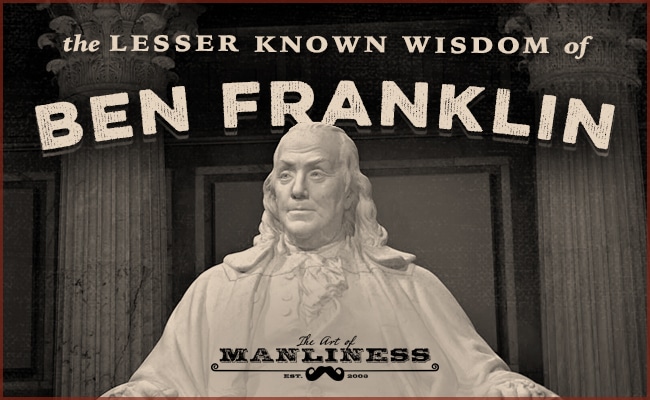Editor’s note: Over 1,000 years old, the Hávamál (“Sayings of the High One”) is a series of Old Norse poems from the Viking age. Stanzas 1-80 include a collection of proverbs and wisdom sayings that are attributed to the god Odin. The maxims deal with the rules of being a guest and showing hospitality — behaviors that for the Vikings were more than a matter of etiquette, but of honor. They also concern general counsels for how a man should conduct himself and live worthily.
1. All door-ways,
before going forward,
should be looked to;
for difficult it is to know
where foes may sit
within a dwelling.
2. Givers, hail!
A guest is come in:
where shall he sit?
In much haste is he,
who on the ways has
to try his luck.
3. Fire is needful
to him who is come in,
and whose knees are frozen;
food and rainment
a man requires,
wheo’er the fell has travelled.
4. Water to him is needful
who for refection comes,
a towel and hospitable invitation,
a good reception;
if he can get it,
discourse and answer.
5. Wit is needful
to him who travels far:
at home all is easy.
A laughing-stock is he
who nothing knows,
and with the instructed sits.
6. Of his understanding
no one should be proud,
but rather in conduct cautious.
When the prudent and taciturn
come to a dwelling,
harm seldom befalls the cautious;
for a firmer friend
no man ever gets
than great sagacity.
7. A wary guest
who to refection comes,
keeps a cautious silence,
with his hears listens,
and with his eyes observes:
so explores every prudent man.
8. He is happy,
who for himself obtains
fame and kind words:
less sure is that
which a man must have
in another’s breast.
9. He is happy,
who in himself possesses
fame and wit while living;
for bad counsels
have oft been received
from another’s breast.
10. A better burden
no man bears on the way
than much good sense;
that is thought better than riches
in a strange place;
such is the recourse of the indigent.
11. A worse provision
on the way he cannot carry
than too much beer-bibbing;
so good is not,
as it is said,
beer for the sons of men.
12. A worse provision
no man can take from table
than too much beer-bibbing:
for the more he drinks
the less control he has
of his own mind.
13. Oblivion’s heron ‘tis called
that over potations hovers,
he steals the minds of men.
With this bird’s pinions
I was fettered
in Gunnlöds dwelling.
14. Drunk I was,
I was over-drunk,
at that cunning Fjalar’s.
It’s the best drunkenness,
when every one after it
regains his reason.
15. Taciturn and prudent,
and in war daring
should a king’s children be;
joyous and liberal
every one should be
until the hour of his death.
16. A cowardly man
thinks he will ever live,
if warfare he avoids;
but old age will
give him no peace,
though spears may spare him.
17. A fool gapes
when to a house he comes,
to himself mutters or is silent;
but all at once,
if he gets drink,
then is the man’s mind displayed.
18. He alone knows
who wanders wide,
and has much experienced,
by what disposition
each man is ruled,
who common sense possesses.
19. Let a man hold the cup,
yet of the mead drink moderately,
speak sensibly or be silent.
As of a fault
no man will admonish thee,
if thou goest betimes to sleep.
20. A greedy man,
if he be not moderate,
eats to his mortal sorrow.
Oftentimes his belly
draws laughter on a silly man,
who among the prudent comes.
21. Cattle know
when to go home,
and then from grazing cease;
but a foolish man
never knows
his stomach’s measure.
22. A miserable man,
and ill-conditioned,
sneers at every thing;
one thing he knows not,
which he ought to know,
that he is not free from faults.
23. A foolish man
is all night awake,
pondering over everything;
he then grows tired;
and when morning comes,
all is lament as before.
24. A foolish man
thinks all who on him smile
to be his friends;
he feels it not,
although they speak ill of him,
when he sits among the clever.
25. A foolish man
thinks all who speak him fair
to be his friends;
but he will find,
if into court he comes,
that he has few advocates.
26. A foolish man
thinks he knows everything
if placed in unexpected difficulty;
but he knows not
what to answer,
if to the test he is put.
27. A foolish man,
who among people comes,
had best be silent;
for no one knows
that he knows nothing,
unless he talks too much.
He who previously knew nothing
will still know nothing
talk he ever so much.
28. He thinks himself wise,
who can ask questions
and converse also;
conceal his ignorance
no one can,
because it circulates among men.
29. He utters too many
futile words
who is never silent;
a garrulous tongue,
if it be not checked,
sings often to its own harm.
30. For a gazing-stock
no man shall have another,
although he come a stranger to his house.
Many a one thinks himself wise,
if he is not questioned,
and can sit in a dry habit.
31. Clever thinks himself
the guest who jeers a guest,
if he takes to flight.
Knows it not certainly
he who prates at meat,
whether he babbles among foes.
32. Many men
are mutually well-disposed,
yet at table will torment each other.
That strife will ever be;
guest will guest irritate.
33. Early meals
a man should often take,
unless to a friend’s house he goes;
else he will sit and mope,
will seem half-famished,
and can of few things inquire.
34. Long is and indirect the way
to a bad friend’s,
though by the road he dwell;
but to a good friend’s
the paths lie direct,
though he be far away.
35. A guest should depart,
not always stay
in one place.
The welcome becomes unwelcome,
if he too long continues
in another’s house.
36. One’s own house is best,
small though it be;
at home is every one his own master.
Though he but two goats possess,
and a straw-thatched cot,
even that is better than begging.
37. One’s own house is best,
small though it be,
at home is every one his own master.
Bleeding at heart is he,
who has to ask
for food at every meal-tide.
38. Leaving in the field his arms,
let no man go
a foot’s length forward;
for it is hard to know
when on the way
a man may need his weapon.
39. I have never found a
man so bountiful,
or so hospitable
that he refused a present;
of his property
so liberal
that he scorned a recompense.
40. Of the property
which he has gained
no man should suffer need;
for the hated oft is spared
what for the dear was destined.
Much goes worse than is expected.
41. With arms and vestments
friends should each other gladden,
those which are in themselves most sightly.
Givers and requiters
are longest friends,
if all (else) goes well.
42. To his friend
a man should be a friend,
and gifts with gifts requite.
Laughter with laughter
men should receive,
but leasing with lying.
43. To his friend
a man should be a friend,
to him and to his friend;
but of his foe
no man shall
the friend’s friend be.
44. Know, if thou has a friend
whom thou fully trustest,
and from whom thou woulds’t good derive,
thou shouldst blend thy mind with his,
and gifts exchange,
and often go to see him.
45. If thou hast another,
whom thou little trustest,
yet wouldst good from him derive,
thou shouldst speak him fair,
but think craftily,
and leasing pay with lying.
46. But of him yet further,
whom thou little trustest,
and thou suspectest his affection;
before him thou shouldst laugh,
and contrary to thy thoughts speak:
requital should the gift resemble.
47. I was once young,
I was journeying alone,
and lost my way;
rich I thought myself,
when I met another.
Man is the joy of man.
48. Liberal and brave men live best,
they seldom cherish sorrow;
but a base-minded man
dreads everything;
the niggardly is uneasy even at gifts.
49. My garments in a field
I gave away
to two wooden men:
heroes they seemed to be,
when they got cloaks:
exposed to insult is a naked man.
50. A tree withers
that on a hill-top stands;
protects it neither bark nor leaves:
such is the man
whom no one favours:
why should he live long?
51. Hotter than fire
love for five days burns
between false friends;
but is quenched
when the sixth day comes,
and friendship is all impaired.
52. Something great
is not (always) to be given,
praise is often for a trifle bought.
With half a loaf
and a tilted vessel
I got myself a comrade.
53. Little are the sand-grains,
little the wits,
little the minds of (some) men;
for all men
are not wise alike:
men are everywhere by halves.
54. Moderately wise
should each one be,
but never over-wise:
of those men
the lives are fairest,
who know much well.
55. Moderately wise
should each one be,
but never over-wise;
for a wise man’s heart
is seldom glad,
if he is all-wise who owns it.
56. Moderately wise
should each one be,
but never over-wise.
His destiny let know
no man beforehand;
his mind will be freest from care.
57. Brand burns from brand
until it is burnt out;
fire is from fire quickened.
Man to man
becomes known by speech,
but a fool by his bashful silence.
58. He should early rise,
who another’s property or life
desires to have.
Seldom a sluggish wolf
gets prey,
or a sleeping man victory.
59. Early should rise
he who has few workers,
and go his work to see to;
greatly is he retarded
who sleeps the morn away.
Wealth half depends on energy.
60. Of dry planks
and roof-shingles
a man knows the measure;
of the fire-wood
that may suffice,
both measure and time.
61. Washed and refected
let a man ride to the Thing,
although his garments be not too good;
of his shoes and breeches
let no one be ashamed,
nor of his horse,
although he have not a good one.
62. Inquire and impart
should every man of sense,
who will be accounted sage.
Let one only know,
a second may not;
if three, all the world knows.
63. Gasps and gapes,
when to the sea he comes,
the eagles over old ocean;
so is a man,
who among many comes,
and has few advocates.
64. His power should
every sagacious man
use with discretion;
for he will find,
when among the bold he comes,
that no one alone is the doughtiest.
65. Circumspect and reserved
every man should be,
and wary in trusting friends.
Of the words
that a man says to another
he often pays the penalty.
66. Much too early
I came to many places,
but too late to others;
the beer was drunk,
or not ready:
the disliked seldom hits the moment.
67. Here and there I should
have been invited,
if I a meal had needed;
or two hams had hung,
at that true friend’s,
where of one I had eaten.
68. Fire is best
among the sons of men,
and the sight of the sun,
if his health
a man can have,
with a life free from vice.
69. No man lacks everything,
although his health be bad:
one in his sons is happy,
one in abundant wealth,
one in his good works.
70. It is better to live,
even to live miserably;
a living man can always get a cow.
I saw fire consume
the rich man’s property,
and death stood without his door.
71. The halt can ride on horseback,
the one-handed drive cattle;
the deaf fight and be useful:
to be blind is better
than to be burnt:
no one gets good from a corpse.
72. A son is better,
even if born late,
after his father’s departure.
Gravestones seldom
stand by the way-side
unless raised by a kinsman to a kinsman.
73. Two are adversaries:
the tongue is the bane of the head:
under every cloak
I expect a hand.
74. At night is joyful
he who is sure of travelling enjoyment.
(A ship’s yards are short.)
Variable is an autumn night.
Many are the weather’s changes
in five days,
but more in a month.
75. He (only) knows not
who knows nothing,
that many a one apes another.
One man is rich,
another poor:
let him not be thought blameworthy.
76. Cattle die,
kindred die,
we ourselves also die;
but the fair fame
never dies
of him who has earned it.
77. Cattle die,
kindred die,
we ourselves also die;
but I know one thing
that never dies, –
judgement on each one dead.
78. Full storehouses I saw
at Dives’ sons’:
now bear they the beggar’s staff.
Such are riches;
as is the twinkling of an eye:
of friends they are most fickle.
79. A foolish man,
if he acquires
wealth or a woman’s love,
pride grows within him,
but wisdom never:
he goes on more and more arrogant.
80. Then ‘tis made manifest,
if of runes thou questionest him,
those to the high ones known,
which the great powers invented,
and the great talker painted,
that he had best hold silence.
Be sure to listen to our primer on Viking mythology:







